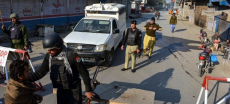[vc_row][vc_column][vc_column_text dp_text_size=”size-4″]LAHORE – In response to the serious accusations faced by former Prime Minister Imran Khan, who has been in custody since August of the previous year, interim Prime Minister Anwaarul Haq Kakar addressed the matter in a recent interview, shedding light on the ongoing developments surrounding the case.
During the interview, Kakar clarified that there is currently insufficient concrete evidence supporting Imran Khan’s alleged involvement in the events of May 9. However, he delved into the possibility of a military trial for those implicated, suggesting that only individuals directly involved should face punishment rather than the entire political party.
Expressing his reservations about punishment solely based on intelligence reports, Kakar noted the challenges posed by members of the Pakistan Tehreek-e-Insaf (PTI) who were involved in the events and are currently in hiding, making it difficult for them to participate in future political activities.
Read more:PM Kakar Promises Positive Updates For Nation Soon
Moreover, Kakar assured the public that the findings related to the May 9 events would be made public through the Inter-Services Public Relations (ISPR) once a thorough investigation is concluded, emphasizing the commitment to transparency and accountability.
Expanding on his comments, the caretaker Prime Minister underscored the importance of a smooth transition of power. He predicted that the results of the upcoming elections would be known by the evening of February 8 or the morning of February 9, setting expectations for a timely resolution of the political situation.
While expressing his firm belief in democracy, Kakar emphasized the need for democratic governance to prioritize improvements in administration and performance, aiming to gain support from the people. As the political landscape continues to evolve, the nation awaits the outcomes of the ongoing investigations and the subsequent developments that will shape the future of its leadership and governance.[/vc_column_text][/vc_column][/vc_row]











